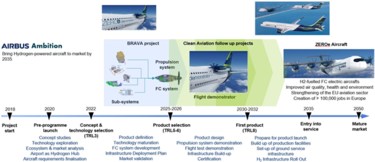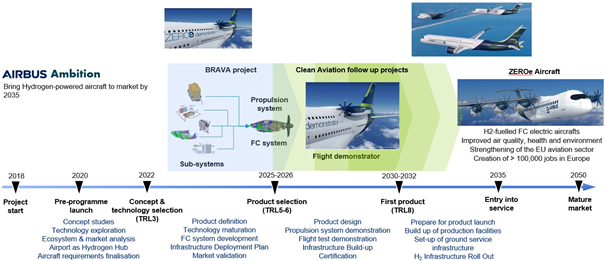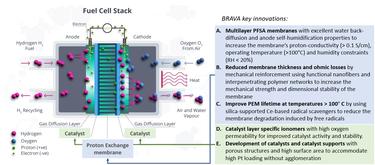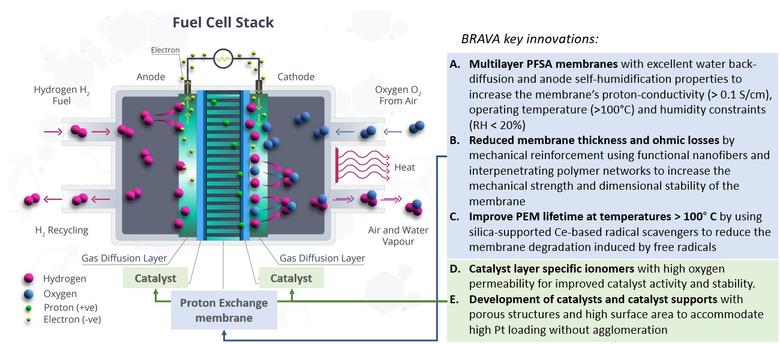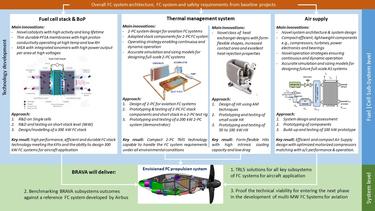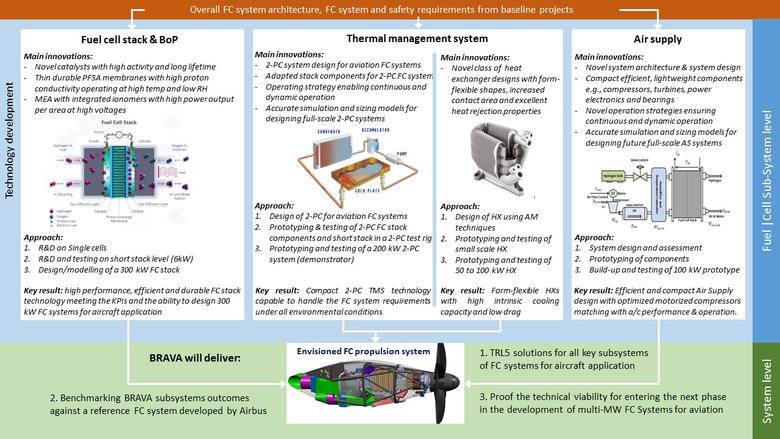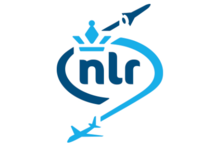Project description
The aviation landscape is on the brink of transformation with PEM Fuel Cell (FC) tech. While proven in autos, its potential for aviation is now realized.
BRAVA has the ambition to develop a FC-based Power Generation Systems (PGS) for aviation surpassing 2 MW power. This system will redefine aircraft propulsion, enabling Airbus's vision of multiMegaWatt Fuel Cell based power generatoin systems PGSs for passenger flights.
BRAVA innovates across FC stack, balance of plant (BoP), thermal management (TMS), heat exchanger, and air supply design. Follow our project news on our LinkedIn page.
With these breakthrough technologies at the core of our mission, BRAVA is set to redefine the possibilities of FC systems in aviation. Join us as we revolutionise the skies and pave the way for a hydrogen-fuelled electric, efficient, and high-performing future of flight by the next decade.
Unleashing the Power of BRAVA: Advancing the Future of Aviation
CHALLENGE
In its mission to develop and test revolutionary technologies for each subsystem, ensuring unparalleled performance and reliability. BRAVA has some challenges to solve:
Critical areas include the FC stack and its Balance of Plant (BoP) components. We'll innovate in Thermal Management System (TMS) with 2-PC system and AM-HX tech. Air Supply system also gets R&D. Each subsystem undergoes rigorous validation before integration, setting new aviation standards.
Our commitment is to exceed requirements at all levels, from specific aircraft specs to system specifications. Every component undergoes exhaustive testing to meet the highest standards. Testing at component and subsystem levels ensures adherence to defined criteria. We evaluate performance against a reference FC system architecture, leveraging baseline technology components. Our dedication to excellence and progress remains unwavering as we pioneer new pathways.
Accelerating Progress: BRAVA’s Path to Innovation
SOLUTION
Within BRAVA, we'll start with a preliminary design phase, envisioning a complete PGS that blends subsystems seamlessly. Though our focus is on subsystem advancements, we recognize that integrating them into the Power Propulsion System (PPS) and aircraft-level integration will come later.
Objectives:
- Define FC-based Power Generation system architecture and safety requirements.
- Design, develop, test, and validate 2-phase cooling system for FC stack.
- Design, develop, test, and validate compact air-to-liquid heat exchangers via additive manufacturing.
- Develop, optimize, test, and validate a high-performance FC stack.
- Develop, test, and validate an air supply subsystem for FC system for aviation.
- Design FC power generation system with high efficiency and power density compatible with aeronautical specifications and constraints.
Revolutionising Fuel Cell Systems for Aviation: BRAVA’s Breakthro
BENEFITS
In the ever-changing realm of civil aviation, current Fuel Cell technologies aren't cutting it for propulsion systems in key markets. BRAVA steps into the spotlight, leading the way in developing advanced technologies tailored specifically for aviation, leveraging the power of Proton Exchange Membrane Fuel Cell (PEMFC) principles.
BRAVA's FC subsystems are poised to deliver groundbreaking results:
- 2-PC based TMS: Our innovative Thermal Management System (TMS) adopts a compact 2-PC design, prioritizing fuel efficiency and weight reduction to enhance overall performance.
- AM HX: Advanced Heat Exchanger (AM HX) technology optimizes heat rejection while seamlessly integrating into aircraft systems, resulting in improved performance and fuel efficiency.
- Advanced Stack Cell Catalysts and Membranes: BRAVA pushes the boundaries of stack cell catalysts and membranes, unlocking higher levels of performance, durability, and operational capabilities.
- Innovative Air Supply Architecture: Our team has meticulously designed an optimized air supply architecture tailored to aviation requirements, minimizing power loss, weight, and ultimately reducing fuel consumption and equipment costs.
- Optimized FC System Architecture: Embracing a holistic approach, BRAVA presents an optimized FC system architecture that promotes compactness, lightweight design, and elevated operational reliability through innovative concepts such as anode and cathode path recirculation.
Funding bodies
 | 
|


